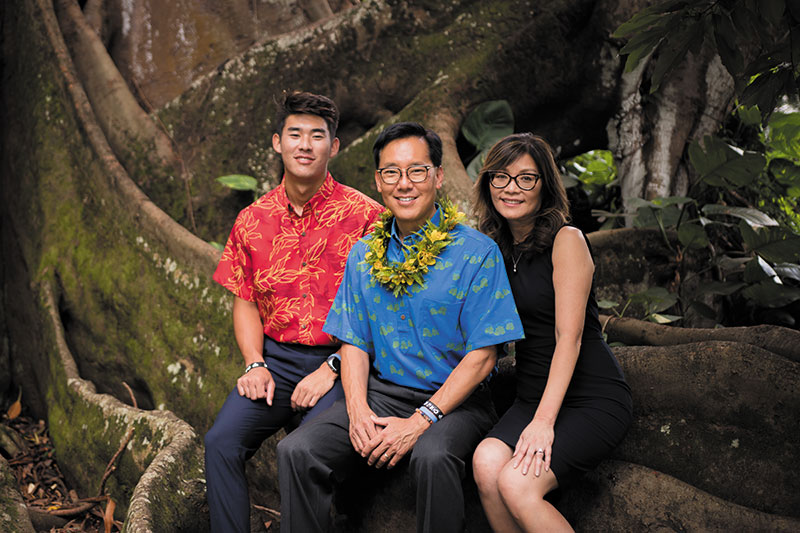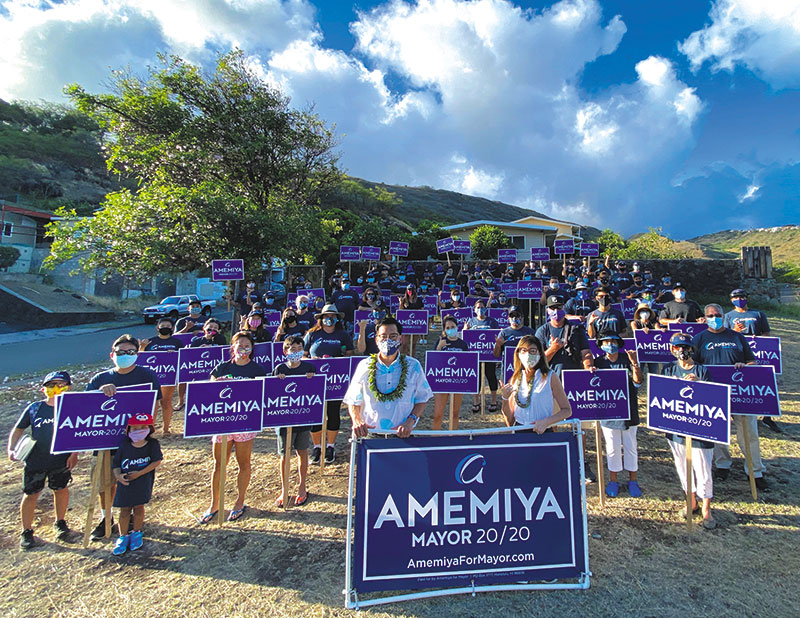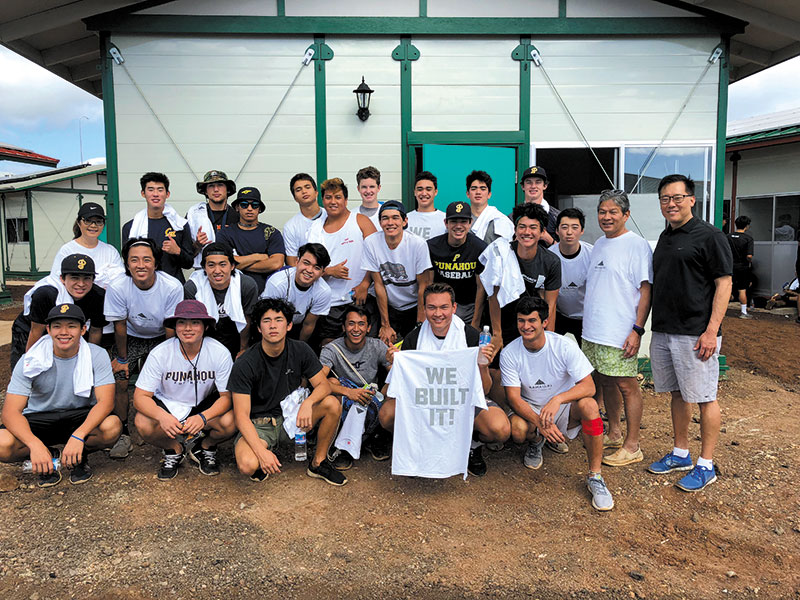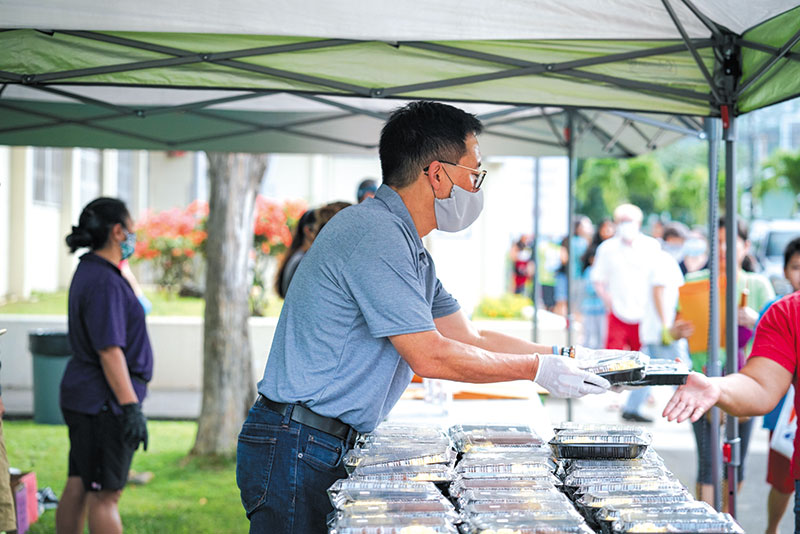The Good Hānai Son

The Amemiyas — Christopher, Keith and Bonny — currently call Pauoa home. MARK GALACGAC PHOTO
Good fruit always comes from good trees. So it is with Keith Amemiya, who, thanks to the lessons taught by his hānai parents and his years of public service, has grown into the next possible mayor of Honolulu.
The bespectacled man seeking to become Honolulu’s top executive was surprisingly not born with that plucky attitude many have come to know him for; rather, he inherited that trait from his best friend’s family.
For the very determined Keith Amemiya, the seeds of his disposition were planted the day hānai parents Bert and Harriet Kobayashi sat him down for a heart-to-heart discussion about his future. Essentially, they told him that although they had welcomed him into their home and raised him since his early teenage years, he — the childhood buddy of their son Christopher and someone whom Bert had frequently coached in youth sports leagues — needed to learn to stand on his own. Therefore, following graduation from Punahou School, he would be expected to fend for himself.
Dutifully, Amemiya accepted the Kobayashis’ decision even though at the time, he had no idea what it took to be a young, responsible adult with everything resting on his shoulders.

The mayoral candidate joins 100 supporters during a sign-waving outing in East O‘ahu. PHOTO COURTESY KEITH AMEMIYA
He would soon find out. “I struggled financially,” admits Amemiya in recalling that period of his life in the 1980s. “I had to work multiple jobs — bussing tables, working as a legal messenger and unloading shipping containers for a trucking company. I even worked the weekends as a handyman to help pay my way through college at the University of Hawai‘i and law school afterward.”
To his credit, he didn’t buckle under pressure. Instead, with each passing day he grew more resilient when faced with challenges. The seeds the Kobayashis had planted in their hānai son had begun to bear good fruit; the first signs of his gritty “can-do, not can’t-do” attitude were firmly taking root.
“It was good for me in the long run,” says an appreciative Amemiya in assessing the Kobayashis’ impact on his life. “Bert and Harriet were great role models for me. While they taught me how to be generous, compassionate and loving, they also showed me the value of hard work and that I could do things on my own.”
These days, Amemiya is working harder than ever, pushing himself as if the future of the city is at stake. Fortunately for him, he isn’t laboring alone. By surrounding himself with a trusted campaign staff that is as resolute as he is, this first-time political candidate has positioned himself as a favorite in the upcoming Honolulu mayoral race. So far, momentum appears to be on his side with last week’s news that he was outpacing his political rivals in campaign funds raised with more than $1.2 million.

Amemiya rallied many community groups, including his son’s baseball teammates at Punahou School, to assist with the building of Kahauiki Village.
Amemiya, 54, has until the Aug. 8 primary to convince O‘ahu voters that he deserves to lead the city into the next decade. If he fails to receive an outright majority of votes but still finishes among the top two candidates in the primary election, he’ll then have one more opportunity to sell the public on his message of change before the Nov. 3 general election runoff.
“It’s important for a mayor to lead by example, and right now the public has little trust in government and political leaders,” says Amemiya. “I want change, and the people want change. They’re tired of the same old politicians running for office and making the same type of decisions that aren’t improving the lives of working-class families.
“I need to show voters that I’m running to be mayor for the right reason,” he continues. “It’s not for personal gain, for wealth or fame, but it’s to fix problems and make the community better.”
So just how does Amemiya plan on curing the city’s ills?
One of the cornerstones of his campaign addresses Honolulu’s severe housing deficit, which he says is “22,000 units short of demand.” To fix this issue, he’s vowed to curb activities such as illegal vacation rentals, which he argues increases the cost of housing. He also intends to push for more affordable housing projects around O‘ahu, and lobby the private sector to develop additional residences within the urban core. There within these hubs, he envisions “a city within a city that’s full of housing, retail outlets, grocery stores, restaurants and entertainment — all within a walkable, bikeable distance of the rail station, and where we can decrease our reliance on cars.”

During the early stages of the COVID-19 shutdown, Amemiya helped organize delivery of 14,000 meals at Palolo and Kauluwela elementary schools. PHOTOS COURTESY KEITH AMEMIYA
As part of his economic recovery package, Amemiya aims to lift residents out of the coronavirus crisis through continued testing, increased contact tracing and vigilant treatment, all the while calling for greater protection of Hawai‘i’s environment and zero-emission transportation for a sustainable future.
“Climate change is the crisis of our lifetime,” he notes.
And while he still views tourism as “a big part of our economy,” Amemiya also believes that greater diversity is required. Industries such as agriculture, aquaculture and renewable energy should be further explored after having been neglected for far too long, he says.
“Those are three areas we can be successful in, but it takes political will,” explains Amemiya. “I don’t like it
when people say that things can’t be done. I’m always optimistic, and I truly believe in my heart that we can get through this economic crisis and be better than ever.”
While critics like to point out his lack of political experience, Amemiya takes pride in his “outsider” status, viewing it as an argument against the status quo. He prefers to tout his accomplishments as a statewide leader, which includes years of public service as executive director of Hawai‘i High School Athletic Association and executive administrator to the Board of Regents at University of Hawai‘i.
During his 12 years with HHSAA, for example, he successfully persuaded many risk-averse principals and athletic directors to launch a second state championship division for the so-called “smaller schools.” It was a move that not only brought in more money for the state, but also increased the level of excitement for prep sports exponentially.
Additionally, Amemiya was the one who, despite early opposition from school administrators, fought to expand the number of girls sports programs, and won. Today, girls sports such as wrestling, golf, water polo and canoe paddling owe their existence to the noble battle Amemiya first waged nearly two decades ago.
“I’ve always believed that in order to move forward, you have to be willing to take calculated risks,” he says, adding that hard work and perseverance have often won over his biggest critics. “But you also have to do your homework and show them on paper, and once you get a track record of success, then the next time you propose something, they’re more open to it.”
Little wonder why so many of his supporters believe that in a city ripe for a leader who can galvanize the masses, Amemiya represents their best hope.
“Keith has got a good skill-set when it comes to dealing with people and making connections with them,” observes wife Bonny. “I think he’s very gifted in that way. When they say he brings people together, it’s true.”
It was 1995 when Amemiya first crossed paths with the woman who would become his life partner. At the time, he was a young civil litigation attorney and Bonny (formerly Suzui) was the CFO of a local fast food chain.
There were no sparks during their initial encounter, in which they initially found themselves working on opposite sides of a lawsuit. Perhaps Amemiya saw an opportunity when he switched law firms in the middle of the case and began representing Bonny’s company. Working closely together, they got to know and like each other.
As Bonny puts it, “When you spend a lot of time with someone, I guess they just grow on you.”
Their first date was dinner at a nondescript sports bar in Honolulu. “He definitely wasn’t trying to impress me,” says Bonny, chuckling at the memory.
Yet, Amemiya apparently did well enough over time to convince her that he was the one. The couple married in 1996, and three years later welcomed their only child, Christopher (named after Amemiya’s best friend), into their world. Since then, the family has lived a rather ordinary life within the walls of their Pauoa home.
“We do a lot of chores and we do a lot of takeout,” notes Bonny, adding that the couple often passes its weekends “watching documentaries” and, prior to COVID-19, attending numerous sporting events together.
Of course, those ordinary days figure to be history if Amemiya finds a new home at Honolulu Hale.
“I suspect that if I’m elected mayor, our lives are all going to change,” he says. “But that’s part of the deal and I’m OK with it.”
If the man who hopes to be O‘ahu’s mayor has learned anything in life, it’s that good deeds need to be reciprocated.
Inspired by the example set by his hānai family following his biological parents’ divorce when he was 10, Amemiya has graciously opened up his home to neighbor island athletes over the past two decades. While their stays are at best only over the summers and school breaks, these student-athletes are no doubt appreciative of the generosity demonstrated by the Amemiyas.
One of the very first guests to their home was former Moloka‘i High standout Kalei Adolpho, who wound up starring in basketball and volleyball at University of Hawai‘i at Mānoa. Today, she serves as girls basketball coach at Moloka‘i High.
“I first met Kalei when she was in middle school and, because she couldn’t get the type of training and player development she needed on Moloka‘i, Bonny and I agreed to let her live with us,” explains Amemiya.
To him, it was just another way of giving back to the community while also paying homage to the family who took him in and taught him, among other things, how to be plucky and stand on his own two feet.
“What the Kobayashis did for me transformed my life,” Amemiya finalizes, “and I’ve always thought that if every teenager could just get one adult to believe in them, what a better world we would have.”
This is a paid advertisement. Paid for by Amemiya for Mayor, P.O. Box 1777, Honolulu, HI 96806. This advertisement is published with the approval and authority of the candidate.






